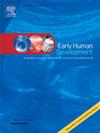Mapping the effects of nurses' developmental care education on infants and families in a surgical neonatal intensive care unit: An observational study
IF 2.2
3区 医学
Q2 OBSTETRICS & GYNECOLOGY
引用次数: 0
Abstract
Developmental care (DC) mitigates the impact of neonatal intensive care unit (NICU) stressors on infants and their families. However, the effect of variable exposure to DC-educated nurses on infant and parent outcomes remains unclear. Social network analysis (SNA), which maps relationships and interaction patterns, was used to evaluate the influence of nurse DC education in a surgical NICU (sNICU). In this prospective observational study, 45 infants >34 weeks' gestation, their parents, and sNICU nurses participated. We examined associations between nurse DC education levels and infants' behavioural and physiological responses during caregiving, nurses' perceptions of infant behaviour, and parents' perceptions of nurse support. Nearly one-third of infants received care from DC-educated nurses for less than half of their hospital admission. Exposure to nurses without DC education was associated with higher odds of infant inconsolability [OR: 11.30 (1.32; 96.56), p = .027], increased requirement for support during caregiving (p = .032) and reduced parental perception of emotional support from nurses [Mean Difference − 0.16 (−0.31; −0.01), p = .043]. Decreased continuity of care (repeat nurse allocation) significantly increased the likelihood of parental depression at 4 months corrected gestational age [OR: 1.93 (1.02; 3.66), p = .044]. These findings highlight the immediate and longer-term effects of DC education and consistent caregiving exposure on parent and infant outcomes. Based on these findings integrating evidence-based DC education and promoting continuity of care in sNICUs should be prioritised to optimise developmental outcomes and support emotional wellbeing during a critical period of infant and family adaptation within and beyond the NICU.
新生儿外科重症监护室护士发展护理教育对婴儿和家庭的影响:一项观察性研究
发育照护(DC)减轻新生儿重症监护病房(NICU)压力源对婴儿及其家庭的影响。然而,接触受过dc教育的护士对婴儿和父母结局的不同影响仍不清楚。社会网络分析(SNA),映射关系和互动模式,用于评估护士DC教育对外科NICU (sNICU)的影响。在这项前瞻性观察研究中,45名妊娠34周的婴儿、他们的父母和sNICU护士参与了这项研究。我们研究了护士DC教育水平与婴儿在护理过程中的行为和生理反应、护士对婴儿行为的看法以及父母对护士支持的看法之间的关系。近三分之一的婴儿在不到一半的住院时间里接受过华盛顿大学教育的护士的护理。接触未受过DC教育的护士与婴儿不安慰的几率较高相关[OR: 11.30 (1.32;96.56), p = 0.027],护理过程中对支持的需求增加(p = 0.032),父母对护士情感支持的感知降低[平均差异- 0.16 (- 0.31;−0.01),p = 0.043]。减少护理连续性(重复护士分配)显著增加4个月矫正胎龄时父母抑郁的可能性[OR: 1.93 (1.02;3.66), p = 0.044]。这些发现强调了DC教育和持续的看护暴露对父母和婴儿结果的直接和长期影响。基于这些发现,在新生儿重症监护室内外婴儿和家庭适应的关键时期,应优先整合循证DC教育和促进snicu护理的连续性,以优化发展结果并支持情感健康。
本文章由计算机程序翻译,如有差异,请以英文原文为准。
求助全文
约1分钟内获得全文
求助全文
来源期刊

Early human development
医学-妇产科学
CiteScore
4.40
自引率
4.00%
发文量
100
审稿时长
46 days
期刊介绍:
Established as an authoritative, highly cited voice on early human development, Early Human Development provides a unique opportunity for researchers and clinicians to bridge the communication gap between disciplines. Creating a forum for the productive exchange of ideas concerning early human growth and development, the journal publishes original research and clinical papers with particular emphasis on the continuum between fetal life and the perinatal period; aspects of postnatal growth influenced by early events; and the safeguarding of the quality of human survival.
The first comprehensive and interdisciplinary journal in this area of growing importance, Early Human Development offers pertinent contributions to the following subject areas:
Fetology; perinatology; pediatrics; growth and development; obstetrics; reproduction and fertility; epidemiology; behavioural sciences; nutrition and metabolism; teratology; neurology; brain biology; developmental psychology and screening.
 求助内容:
求助内容: 应助结果提醒方式:
应助结果提醒方式:


